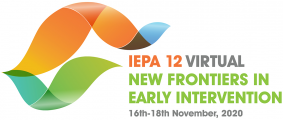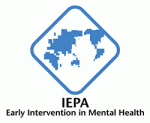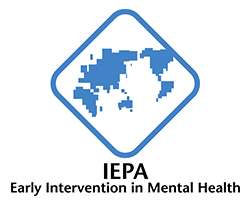Registration
INFORMATION
REGISTER FOR ON DEMAND ACCESS
You can now Register for On Demand Access to IEPA12 Virtual:
On Demand Registration to IEPA12 Virtual includes:
- On Demand access to 11 Plenary Sessions
- On Demand access to recorded Q&A sessions with all Plenary Speakers
- Access to ALL recorded content for 6 months so that you can re-watch, revisit or catch up on missed content in your own time
- Access to an online resource gallery displaying a range of early intervention resources
- A personalised certificate of attendance , specifying 6 hours CPD
REGISTRATION RATES
The registration table below is divided in groups according to the World Bank list of economies. Therefore, the categories are: High income, Upper middle income, Lower middle income and Low income.
Other options are: IEPA Members, Students, People with Lived Experience/Carers/Family
Please, check the World Bank list here. All prices are in USD.
LANGUAGE
English is the official language of the IEPA 2020, so all sessions will be delivered in English only.
| Early Bird Rate until 30th September 2020 |
Regular Rate until 16th November, 2020 |
On Demand Rate | ||
| Member | Latin America* | n/a | n/a | n/a |
| Non Member | Latin America* | n/a | n/a | n/a |
| Members | High income | $108 | $120.00 | $120.00 |
| Upper middle income | $94.50 | $105 | $105 | |
| Lower middle income | $85.50 | $95 | $95 | |
| Low income | $76.50 | $85 | $85 | |
| Non Members | High income | $135 | $150.00 | $150.00 |
| Upper middle income | $112.50 | $125 | $125 | |
| Lower middle income | $99 | $110 | $110 | |
| Low income | $90 | $100 | $100 | |
| Student** | High income | $54 | $60 | $60 |
| Upper middle income | $45 | $50 | $50 | |
| Lower middle income | $36 | $40 | $40 | |
| Low income | $27 | $30 | $30 | |
| Lived Experience / Carers / Family | High income | $45 | $50 | $50 |
| Upper middle income | $36 | $40 | $40 | |
| Lower middle income | $27 | $30 | $30 | |
| Low income | $13.50 | $15 | $15 | |
| Accompanying Person | n/a | n/a | n/a | |
| GROUP (Minimum 20 people) All those in a group booking must be IEPA members |
Early Bird Rate until 30th September 2020 |
Regular Rate until 16th November, 2020 |
Onsite Rate | |
| Member | n/a | n/a | n/a | |
Participants registration fees include:
- Access to all scientific sessions and exhibition hall
- Participants conference material
- Opening and closing ceremonies
REGISTRATION TYPES
The registration table is divided in groups according to the World Bank list of economies. Therefore the categories are: High income, Upper middle income, Lower middle income and Low income.
Other options are: IEPA Members, Students, People with Lived Experience/ Carers/Family
Check the World Bank list here.
IEPA Members receive discounted registration rates for participation in the conference. Membership is free and open to all individuals with an interest in the area of early intervention in mental health. Visit our website for membership information and to submit an application. Please contact secretariat@iepa.org.au if you have misplaced your membership number and unable to find it on the membership lookup area.
Student Discounts are available for students currently enrolled in a college or university studying mental health. You will be required on the registration system to submit a letter from your supervisor requesting the student registration discount on your behalf. Once your letter has been received and approved, your registration will be released for you to complete the payment. Confirmation of payment will then be sent.
Two times per week our team will check the letters received. Please check back after a week to ensure your registration has been approved to complete payment.
People with Lived Experience, Carers and family members are very welcome to attend. If you require any further information please email email iepa@iepaconference.org
Exhibitor’s Registration. Exhibitors are vendors with products and/or services being promoted in booth space during the conference (unless registration is included in a sponsorship package). Please, contact the commercial department at iepa@iepaconference.org to receive more information about the registration process.
Membership Questions
Membership questions should be sent to membership@iepa.org.au
REGISTRATION FAQ
I forgot my IEPA Membership Number. How can I look it up?
If you think you may already be a member, please Look Up Your IEPA Membership Number.
For any questions please email membership@iepa.org.au
How can I become a member to register at member rates?
Membership is currently free and open to all individuals with an interest in the area of early intervention in mental health. Membership must be confirmed by the IEPA Board, which takes up to six weeks upon receipt of the Membership Application Form. For more information, visit our community membership page here, or email membership@iepa.org.au.
I do not have a PayPal account and/or do not want to create one. Is there another way to make a payment?
You do NOT need to have a PayPal account to use PayPal. Select “Pay with Debit or Credit Card” located below the PayPal login fields. You may also contact the Registration Desk to make other payment arrangements.
I am unable to pay by credit card. Are other payment options available?
You may request an invoice to pay by wire transfer directly to the IEPA Bank Account. Please note an additional cost of US$100 will be incurred if an invoice is requested. First, complete the registration information for each attendee and include the attendee name(s) in your email request for an invoice to iepa@iepaconference.org. All payments must be made in U.S. dollars.
As taxas de inscrição dos participantes incluem:
- Acesso a todas as sessões científicas e área de exposição
- Material do congresso
- Cerimônias de abertura e encerramento
TIPOS DE CATEGORIAS
A tabela de inscrição é dividida em grupos de acordo com a lista de economias do Banco Mundial. Portanto, as categorias são: High income, Upper middle income, Lower middle income and Low income.
Outras opções são: Membros do IEPA, Estudantes de graduação, pessoas com experiência na área de saúde mental / cuidadores / família,
Por favor, verifique a lista do Banco Mundial aqui e veja a classificação do seu país.
Membros do IEPA tem desconto na inscrição para participar da conferência. A associação é gratuita e aberta a todos os indivíduos com interesse na área de intervenção precoce em saúde mental. Visite nosso site para obter mais informações e se associar. Por favor, entre em contato com secretariat@iepa.org.au se você tiver perdido o seu número de associado e não conseguiu encontrá-lo na sua área restrita.
Desconto para estudantes está disponível para matriculados em universidades que estudam saúde mental. É necessário anexar ao cadastro no sistema, a declaração da sua universidade / do seu orientador solicitando o desconto em seu nome. Uma vez que sua declaração tenha sido recebida e aprovada, seu registro será liberado para que conclua o seu pagamento. A confirmação do pagamento será enviada por e-mail ou poderá ser baixada na sua área de restrita de participante.
Duas vezes por semana, nossa equipe verificará as declarações recebidas. Após uma semana que tenha enviado a sua declaração, por favor, retorne ao sistema para verificar se o arquivo foi aprovado e concluir o pagamento.
Registro do Expositor está disponível para os fornecedores de produtos e / ou serviços promovidos no estande durante a conferência (a menos que o registro esteja incluso em um pacote de patrocínio). Por favor, entre em contato com o departamento comercial através do e-mail iepa@iepaconference.org para obter mais informações sobre o processo de inscrição.
Perguntas sobre a afiliação ao IEPA
Devem ser enviadas para membership@iepa.org.au qualquer dúvida sobre a sua situação de membro ou nova afiliação.
PERGUNTAS FREQUENTES SOBRE INSCRIÇÃO
Esqueci meu número de filiação do IEPA. Como posso localizar?
Se você for um membro, por favor, procure o seu número de associação IEPA na sua área restrita.
Para qualquer dúvida envie um e-mail para membership@iepa.org.au.
Como posso me tornar um membro para se registrar com desconto no congresso?
A adesão é atualmente gratuita e aberta a todos os indivíduos com interesse na área de intervenção precoce em saúde mental. A afiliação deve ser confirmada pelo Conselho do IEPA, que leva até seis semanas após o recebimento do Formulário de Inscrição para Afiliados. Para obter mais informações, visite nossa página de associação da comunidade aqui ou envie um e-mail para membership@iepa.org.au.
Eu não tenho uma conta no PayPal e / ou não quero criar uma. Existe outra maneira de efetuar um pagamento?
Você NÃO precisa ter uma conta do PayPal para usar este meio de pagamento. Selecione “Pagar com cartão de débito ou crédito” localizado abaixo dos campos de login do PayPal. Você também pode entrar em contato com o nosso time de inscrição via e-mail iepa@iepaconference.org para obter mais informações.






















